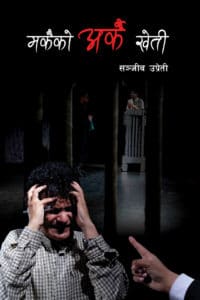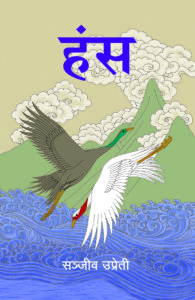
Restart Publishing Talks with Dr. Sanjeev Uprety on Writing, Literature, and Global Market

SUSHANT THAPA
May 23, 2020
Ultimately this is related to the broad issue of social justice. I feel that writers and intellectuals should write, think, and fight for social justice. This is the only politics I practice.
Dr. Sanjeev Uprety has taught English Literature at Tribhuwan University in Kathmandu, Nepal for 25 years. Before this, he completed his master’s degree from Brown University in Cultural Studies and received his post-doctoral in South Asian Masculinities from Harvard and UC Berkeley Universities. Dr. Uprety is a well-known novelist, cultural critic, playwright, and theater artist. His published works include ‘Ghanachakkar’ (novel), ‘Siddhantha Ka Kura’ (cultural theory), ‘Makaiko Arkai Kheti’ (play), and ‘Hansa’ (novel). In an interview with Sushant Thapa for Restart Publishing, Dr. Uprety talks about writing, his published works, global market of Nepali literature, and more –
Sushant: Hello Dr. Uprety, how are you these days? Can you please tell me a little about your current writing project? How did you start your writing career?
Dr. Uprety: I’m good and thank you for asking. I am spending time with family during the lockdown, especially with my father who is 88 years old. Also, I am following Corona pandemic news on the internet. Recently wrote a few newspaper articles discussing political, economic, and environmental aspects of the pandemic. I am also working on my next novel, but it is too early to talk about it. I started writing when I was in high school.
 Sushant: Since you said you started writing in high school, did you also write poems? What is the message of your play, ‘Makaiko Arkai Kheti’?
Sushant: Since you said you started writing in high school, did you also write poems? What is the message of your play, ‘Makaiko Arkai Kheti’?
Dr. Uprety: Yes, I started by writing poems in school. After that however, I shifted towards fiction and cultural theory. As for Makaiko Arkai Kheti, the play examines the conflict between the notion of “political correctness” and “authorial responsibility” in the context of the twenty-first century.
Sushant: Are you also planning to write novels in the English language?
Dr. Uprety: I am not sure at this point. I am enjoying writing in Nepali these days. My main reason for writing fiction is creating a self-sustained world that is consistent with itself, and the challenge that goes into creating such a world. The second reason is interacting with readers who get inside that world through the act of reading and discussing with them how they interacted with various turns and twists of the story, how they found the characters and plot. Both of these goals are fulfilled by writing in Nepali. For this reason, I am not feeling any strong urge to write in English currently, but who knows what will happen in the future. Time will tell.
Sushant: How do you think Nepalese writers can create their space in the international market? Is it only possible by writing in English?
Dr. Uprety: The first thing is that they should keep working on their craft and write good books, in whatever language they write. Secondly, the literature academy should help create a strong group of translators who can translate the works into other languages, not only in English but regional languages like Hindi and Chinese, for instance. Languages such as Hindi and Chinese will become more important globally as the World order shifts. So, writers and translators especially those in South Asian regions, should not limit themselves only to English.
Sushant: Why have you chosen bird characters (Swan) in your novel ‘Hansa’? Are human characters unable to convey the message that you want to write? What is your message in ‘Hansa’?
 Dr. Uprety: In Hansa, there are both bird characters and human characters. There are two interrelated and overlapping stories in the novel: that of birds and humans. My aim in doing so was to challenge and deconstruct human-centered world views and values that have dominated the history of this planet. I feel we need to rethink the relation between Humans and Nature as well as the relationship between humans and other creatures including plants, birds, and animals.
Dr. Uprety: In Hansa, there are both bird characters and human characters. There are two interrelated and overlapping stories in the novel: that of birds and humans. My aim in doing so was to challenge and deconstruct human-centered world views and values that have dominated the history of this planet. I feel we need to rethink the relation between Humans and Nature as well as the relationship between humans and other creatures including plants, birds, and animals.
Sushant: What is literature from your point of view? What type of awakening can literature bring in society?
Dr. Uprety: Literature is a reflection of society and inner psychological beings of characters. But at the same time, it can also be used to transform age-long ideologies and social norms including norms concerning gender, class, and caste. Also, literature can work as a medium to imagine alternative political, economic, social, and technological futures of the world.
Sushant: What is the politics of your work? Is there any political consciousness in your literary works? Since you were involved in demonstrations, was it only related to literature or also to politics?
Dr. Uprety: I think human beings are political animals. By politics I do not mean party politics, but the network of socio-economic and politico-cultural power that runs through the social fabric. From this perspective it is not possible to be free from politics. Even when someone says I am “apolitical” such neutrality is a political position in itself. As for now I am not a member of any political party and never will be. However, as a writer and a conscious citizen I feel it is my responsibility to speak for those who cannot speak for themselves, including poor people, and for the marginalized communities of all kinds, be they women, dalits or sexually stigmatized people. Ultimately this is related to the broad issue of social justice. I feel that writers and intellectuals should write, think, and fight for social justice. This is the only politics I practice.
Sushant: What is the message of your two works ‘Ghanchakkar’ and ‘Siddhantaka Kura’?
Dr. Uprety: These two are different. The first is a work of fiction, the second a book on contemporary cultural theories ranging from Marxism and postcolonialism to gender studies, disability studies, and environmental criticism, among others. In Ghanchakkar, I examined the notion of both personal and societal madness by using the techniques of fantasy, unreliable narrator, and mixing of fact and fiction. I feel that none of the human societies in the world are fully sane and that there are insanities within all of us. As for Siddhantaka Kura, the message was that all of us should constantly keep on revisiting ourselves to see what social ideologies and norms have shaped our thoughts and innermost being. Unless we do that, we cannot be free or “mukta”. I am using the term mukta/mukti here in secular rather than the spiritual sense of the word. I feel that the cultural theories that I discussed in Siddhantaka Kura help us to achieve mukti or personal liberation by freeing us from the ideological baggage that shapes our utterances and behaviors throughout life.
Sushant: Lastly, what is the current scenario of Nepalese literature in Nepal and abroad?
Dr. Uprety: As elsewhere, some good books are being written and some are not so good. New writers are coming up and taking up new themes including migration, gender disparity, sexual migration, and so forth. I feel that in the post corona pandemic period many will start writing about the environment too. These are good signs. I feel that the best literary works coming from Nepal are being written in Nepali and not in English at the moment. As I also said earlier, the need of the moment is to produce a strong group of translators who can translate Nepali texts into English and other languages such as Hindi and Chinese or French, among others. Also, there are other languages in Nepal apart from Nepali including Maithili, Bhojpuri, Limbu, Gurung, etc. I think the effort should be made to translate from these languages to Nepali and from Nepali to these “local” languages. This will truly reflect the ideal of multi-cultural Nepal.




Enjoy it.
Thanks for taking the time to read it, Ashok!
“I feel that writers and intellectuals should write, think, and fight for social justice. This is the only politics I practice.”